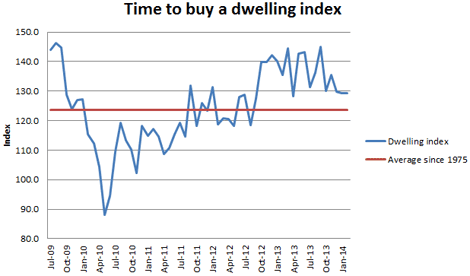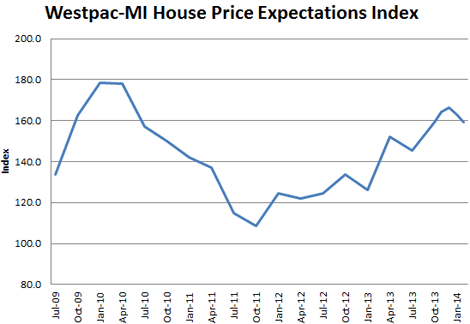Analysis – Why weak consumer sentiment hasn’t stopped demand for housing
Unemployment is the highest it has been in a decade and consumers are gloomy about the local economic outlook. But most people still expect house prices to rise and think that now is a good time to buy.
General consumer confidence dropped in February, hitting its lowest point since last July, the Westpac Melbourne Institute Consumer Sentiment Index revealed. The index, released last week, fell by 3% in February to 100.2 from the January reading of 103.3.
Consumer expectations on the outlook for the economy over the next 12 months were at their lowest since March 2012, having fallen 17.9% since the same time last year. Expectations for the next five years were at their weakest since February 2009, the Index showed.
Westpac chief economist Bill Evans put the poor results down to a run of bad news on the motor vehicle industry, other manufacturers, and Qantas, as well as heightened concerns about what to expect from the May Budget. A larger group of people also expected interest rates to rise over the next 12 months compared with the last time the bank surveyed on that topic in August 2013.
Despite the negative views, the latest survey found consumer attitudes towards buying residential property have stabilised and are still firmly in positive territory.
The “Time to buy a dwelling” component of the index came in at 129.3 in February, just a fraction down on January’s 129.4 reading and the 129.8 result for December 2013.

Source: Westpac Melbourne Institute Consumer Sentiment Index
Westpac senior economist Matthew Hassan told Property Observer a reading of 129.3 was quite good, although it is down 10.8% from its recent peak in September. “It should also be noted that responses tend to be positive - the average reading since 1975 has been 123.5,” Hassan said.
Expectations on house prices were still 26.2% above where they were at the start of last year. That’s despite a 2.2% fall in the house price expectations component of the Index which left it 4.3% below its December peak.

Source: Westpac Melbourne Institute Consumer Sentiment Index
As to why attitudes towards housing were holding up while broader sentiment was weakening, Hassan said the main reason was likely to be that mortgage interest rates were near record lows and the market was showing strong gains.
“We tend to find the index is influenced by both affordability and expectations for capital gains,” Hassan said.
NAB’s Quarterly Australian Residential Property Survey released last Thursday showed similar expectations of price appreciation.
Respondents to that survey anticipate price gains in the range of 2 to 4% over the next couple of years. NAB’s own forecasts are slightly higher. It predicts average capital city house prices will rise by 6% to end of 2014 and 5% to the end of 2015.
“The story is modest but slowing growth over the next couple of years,” NAB senior economist Robert De luce told Property Observer. “That boils down to the impact of low interest rates, affordability, population growth and long-standing supply issues.”
NAB’s survey considers foreign buyers’ impact on the market. These people are outside of the local economy so their demand is less influenced by conditions in Australia.
De luce said there was little hard data around foreign buyers but according to NAB’s analysis, 6.5% of established dwellings and 11% of new properties are bought by overseas buyers.
HSBC chief economist Paul Bloxham said consumer sentiment was usually a timely indicator of economic conditions, but it wasn’t uncommon for there to be a large discrepancy between sentiment and spending behaviour.
“Sentiment indicators can provide valuable signals of what to expect for the future, but not always,” Bloxham says. “When you’re summing up what’s going on in the economy not everything is always moving in the same direction.”
Bloxham and colleague HSBC economist Adam Richardson put out a report last week examining unemployment, which hit 6% in January, its highest level in a decade.
Bloxham and Richardson argue that while the unemployment figure looks bad – like the headline consumer sentiment numbers – other economic indicators, such as retail sales, business conditions and building approvals have picked up in recent months, pointing to a strengthening economy. Booming house prices also showed the economy was more resilient than sentiment would suggest.
news@propertyobserver.com.au